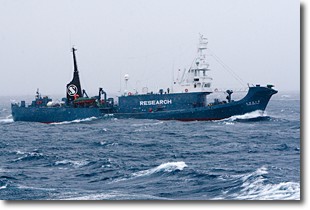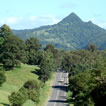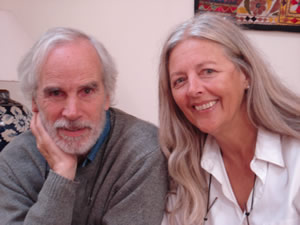Mullumbimby Action Group -> moviechannel -> dougtompkins
Huge Turnout for Doug Tompkins at Mullumbimby
Doug Tompkins and Helena Norberg Hodge. In the video Helena talks with Doug about the New Economy
A capacity crowd overflowed the Mullumbimby Civic Hall last night for a
talk and presentation , entitled, "Bringing the Economy back Home" by Doug
Tompkins, who is possibly the most influential environmentalist in the
world today. Doug had just spent more than a month aboard the Steve Irwin
for Sea Shepherd, and gave his only public talk in Australia in
Mullumbimby!!
Doug was introduced by Helena Norberg Hodge. He then started the evening
by relating his experience aboard the "Steve Irwin" chasing Japanese
whalers in the southern ocean.
The Steve Irwin set off from Hobart in December. Present at the sending off ceremony were Senators Bob Brown and Christine Milne. Doug continued," We had 45 people aboard , the captain being Paul Watson. Most of the provisions were sourced from Tasmania, including fuel for the ship and aviation fuel for the ship's helicopter. The ship has a small helipad and helicopter pilot. The Steve Irwin has a fully equipped press room, and staff who put the maximum world-wide pressure on the Japanese Whalers."
Doug said "Our biggest problems were caused by ice, and the huge waves encountered in the Southern Ocean. Up to 15 meters, buffeting the ship and throwing stuff all over the place. The ship needed constant repairs carried out by willing volunteers 24 hours a day. This included painting, scraping and dents caused by the ice."
He continued, "We had on board a Japanese activist who had always to be incognito, so her family in Japan would not be harassed. The kitchen/galley was run by three women who prepared wonderful vegan meals. The crew also included a doctor, first aid team and medical equipment."
Working on the deck was tough, big waves, freezing rain, icicles, and icy spray made it very dangerous. The Steve Irwin is not an ice breaker, so we had to be very careful in the pack ice near Antarctica. Several times we almost became stuck in the ice while chasing the Japanese whalers. There was one particular incident where we thought we were in serious trouble. It looked like we were going to come down onto a huge iceberg, the ship was thrown into full reverse and we just avoided splitting the hull which would have been drastic.
 All the ships in the Japanese Whaling fleet have big signs painted on the side saying "RESEARCH". Of course most of the world does not believe them, they are just exploiting loop holes in the rules.
All the ships in the Japanese Whaling fleet have big signs painted on the side saying "RESEARCH". Of course most of the world does not believe them, they are just exploiting loop holes in the rules.Our method of disrupting the whalers was to harass them and constantly chase them so they had no time to catch whales. Unfortunately our ship only holds 6 weeks of fuel, and it takes one week each way to get to Tasmania, so we could only spend 4 weeks protecting the whales. The Japanese whalers have guards on their decks dressed like riot police with real guns, which they fired at us last year, hitting the captain, who luckily was wearing a bullet proof vest.
We have been very successful so far this season with no whales caught on our watch. One harpoon ship was disabled and it was refused permission to dock for repairs in Australia and Indonesia. We saw spectacular icebergs and sea ice, penguins and whales a seals much beauty.
The Steve Irwin set off on its second trip of the season on the 21st of January (Ed. source ABC news)
The Next Economy
Doug then showed his DVD called The Next Economy in which he outlined his vision for a biologically sustainable economy. The goals of his Foundation are to make National Parks in Chile and Argentina, giving the highest protection to ecosystems through private conservation farms. From smallholdings to large scale farms these will work as prototype farms which encapsulate his vision. Through reforestation and restoration programmes, a transition from globalisation to localisation can occur.Signposts or Markers
Some of the values Doug proposes are: attention to aesthetics; zero contamination of water; care of soil by practicing the law of return; conservation as a consequence of production; maintaining the ecological integrity of the landscape, and awareness of the ecological footprint of every item used, from household furniture to agricultural machinery. Further, Doug sees systemic analysis an important part of education. He views work as most meaningful when it addresses the degradation of soils, climate change and extinction of species which are part and parcel of the industrial growth monster.Doug proposed some "markers" or signposts as a measure of how a society or economy is going.
One is Beauty, Is it beautiful, does it create beauty, does it foster beauty in our lives, and the nature around us?. Another is "Extinctions". A truly sustainable economy will not cause extinctions of vast numbers of species.
Solutions to the Present Situation
Helena joined Doug for a lively question and answer session after the video. One young person asked how people of his generation can get motivated instead of feeling overwhelmed? Doug replied that it is necessary to know the situation. Study up on it , focus and then plan your actions. This way you don't waste your efforts on a "scatter-gun approach". Feeling overwhelmed, often comes from not being focused.The global crises we see are symptoms of a deeper problem. They are just bushfires, if you spend your time constantly putting out the bushfires without going to the root cause, which Doug believes is "mega Capitalism" and The Globalised economy, you will eventually find the fires becoming completely out of control.
Helena added that this economic system of continuous growth is only 50 years old. She called it "The Growth Monster". It has been created by mankind, and so that means we can replace it with a better way of doing things by us. it is much better to have an alternative to the collapsing economic system, than to wait for it to go under first.
About Doug Tompkins
Following an extremely successful business career, Doug has poured all his energy and almost all his money into restoring ecosystems and supporting strategic initiatives for political and economic change. He lives in Chile and Argentina, where he has bought millions of hectares of land in order to create national parks. For two decades he has been a primary funder of the deep ecology, anti-globalisation and pro-localisation movements worldwide.
| May 2025 | ||||||
|---|---|---|---|---|---|---|
| S | M | T | W | T | F | S |
| 1 | 2 | 3 | ||||
| 4 | 5 | 6 | 7 | 8 | 9 | 10 |
| 11 | 12 | 13 | 14 | 15 | 16 | 17 |
| 18 | 19 | 20 | 21 | 22 | 23 | 24 |
| 25 | 26 | 27 | 28 | 29 | 30 | 31 |
No events for today
Add your event here


